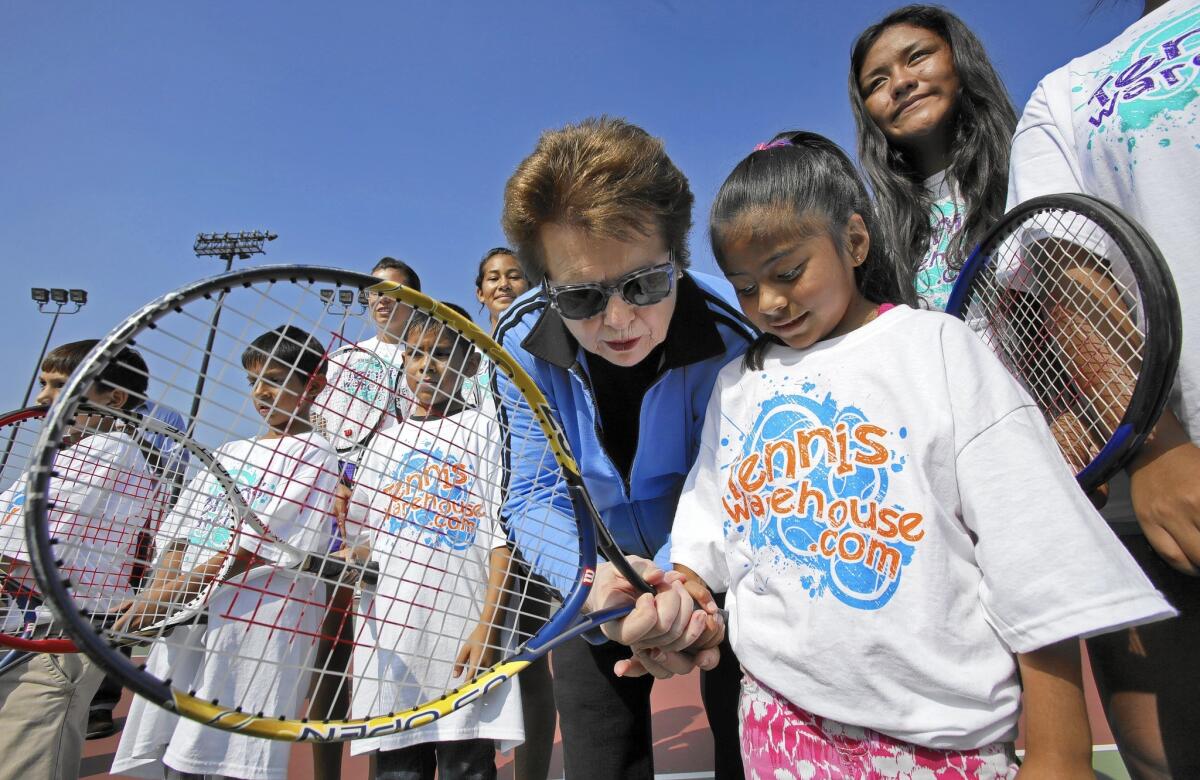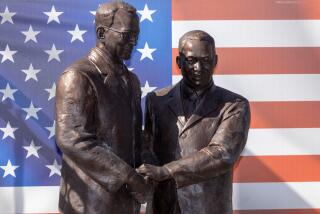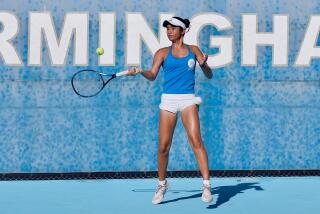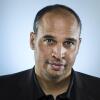Billie Jean King returns to Cal State L.A. to give life, tennis advice

Before she arrived, many of the kids didn’t know who she was — “A neat lady who helps people and stuff,” was one of the best guesses — but Billie Jean King was hardly deterred.
The tennis great and equal rights icon walked carefully across the tennis courts at Cal State Los Angeles on Saturday morning, introducing herself, then doling out fist bumps, tossing out forehand tips and being sure to remind the gaggle of young East L.A. kids in attendance just how important they are.
“I’m over the hill, I’m outta here,” said King, 70, a wry wit to her voice before turning serious. “You guys are the future.... You are the ones who can make a difference in the nation, in the way we live.”
The event was billed as a simple tennis clinic, but it was more than that for King. The 39-time Grand Slam event winner’s social activism, her high-profile fight for equality and women’s rights, was inspired in part by her experiences attending Cal State L.A. in the early 1960s.
Before the clinic began, she recalled her student days, especially a discussion with her college boyfriend, a low-ranked player on the men’s tennis team who had an athletic scholarship. King — Billie Jean Moffitt in those days — wasn’t just the school’s top female player, she was one of the best in the nation and already a Wimbledon doubles champion. But there wasn’t a scholarship available for her; she worked to pay for school.
She was being treated like a second-class citizen, her boyfriend said. “It was a moment I won’t forget,” she recalled. “Energized me. Woke me up.”
Among her many accomplishments, she ended up founding the women’s professional tennis tour with a clutch of other greats. She beat Bobby Riggs in the Battle of the Sexes match in 1973. She backed the call for federal legislation that has fueled the boom in women’s sports.
Most recently, King was named by President Obama to the U.S. delegation to the 2014 Winter Olympics, a response to Russia’s anti-gay legislation. King, who is gay, has long been a leading advocate for LGBT rights.
Through it all, King, who lives in New York, has remained extremely close to Cal State L.A. For the last 17 years she’s been coming back to the university, hosting clinics and galas, helping raise money to boost the school’s sports facilities and teams. “Love this place,” said King, whose father was a Long Beach firefighter. She noted that the student body is about half Latino. “It looks like L.A. Blue-collar, first-generation kids. I can relate.”
With her help, the school this year held a groundbreaking for a two-story, roughly $5-million tennis complex. The structure will be named after one of King’s doubles partners, Rosie Casals, and tennis legend Pancho Gonzalez, who grew up in East L.A. and learned the game, like King, on public courts.
King reminded the clinic participants — about 30 of whom came from an East L.A. Boys and Girls Club — that the complex would be a place where they could spend their free time playing, studying and hanging out.
The kids seemed to regard her words with a skeptical caution. “Honest? I don’t know if other kids from my neighborhood are going to start playing actual tennis,” said Bryan Garcia, 11. “Maybe.”
King said she knows how tough it can be getting kids, especially from impoverished minority communities, to fall for tennis. She wasn’t surprised that few knew of her or her career. (Notably, they were even less familiar with Gonzalez, who grew up just a few miles from campus.) She didn’t mind the challenge.
“If we can just grab a few,” she said. “This sport can change their whole lives. It changed mine.”
More to Read
Start your day right
Sign up for Essential California for news, features and recommendations from the L.A. Times and beyond in your inbox six days a week.
You may occasionally receive promotional content from the Los Angeles Times.







